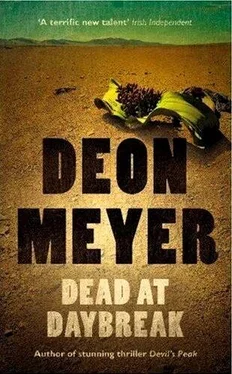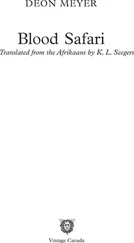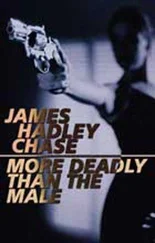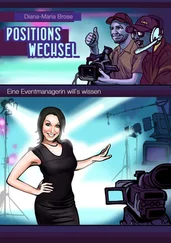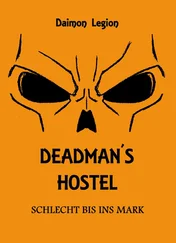It wouldn’t make any difference. Because there simply wasn’t enough. Too little information, too little time.
And it wasn’t going to change. Theal would tell him how and where you could change dollars in the eighties. Or maybe not. And what then? Who would remember Johannes Jacobus X after fifteen years? He could visit Charles Nieuwoudt in Pollsmoor Prison or Victor Verster or whichever jail he might be in and ask whether he falsified the identity document, and what would he get?
Nothing. Not in five days.
Because Nieuwoudt’s brains had been scrambled by drugs and it had been fifteen years and he wouldn’t remember a thing.
That was the problem. The case wasn’t ten months old. It was fifteen years old. Someone had known there was something in that safe worth killing for. He didn’t know what it was. He might as well admit it. He hadn’t the faintest idea what had been in that safe. He could speculate on the basis of a fucking slip of paper until he was blue in the face. He could formulate his clever theories until he died of boredom. It could have been anything. Krugerrands. Gold. Diamonds. Rand or dollars or fucking Monopoly money. It could have been nude photographs of Bill Clinton or the fucking Spice Girls. It could have been a map of pirate’s treasure and he would never know because the thing was as dead as a doornail and he couldn’t get it breathing with mouth-to-mouth resuscitation or a heart-lung machine.
He knew he was right. More than a thought-through conclusion. Instinct. Everything he had learned told him that it would take time. Weeks. Months of fine-tooth combing, of talking, of asking questions until something unraveled and gave you a thread you could tug, pull, wiggle.
He pulled off at the Kraaifontein interchange, turned right over the bridge and right again back to the city on the N1. Where had she said she lived? Milnerton.
Curious. He would have placed her near the mountain with her yuppie hairdo and her BMW, the fucking mountain that brooded. He hated that mountain, hated this place that had made him think he could stage a comeback overnight: Hi, sweetheart, I’m home, I’m a detective again, isn’t it great!
♦
She was busy digging compost into the oleanders when she heard the cell phone ringing. She pulled off the gloves as she walked, opened the sliding door, and answered the phone.
“Hope Beneke.”
“I want to see you.” His voice dark and abrupt.
“Of course,” she said.
“Now.” He heard the irritating sympathy again, the I-understand-everything-now-and-can-be-patient-with-you tone in her voice.
“Fine.”
“I don’t know where you live.”
“Where are you?”
“Milnerton. At Pick ’n Pay.”
She gave him directions.
“Good,” he said, and put the phone down.
“Good-bye,” she said, “Zatopek.” And smiled to herself. He wasn’t a ray of sunshine. What did he look like when he laughed?
She walked to the bathroom, pulled a comb through her short hair, applied pale pink lipstick. She wasn’t going to change. The tracksuit was fine. She went to the kitchen, put on the kettle, took out the small white tray, put out the mugs, the milk jug, the sugar bowl. She should have bought something at the Home Industry. A tart. It was almost coffee time.
She walked to the mini hi-fi. She didn’t really know much about classical music. Was he very knowledgeable? She had The World’s Greatest Arias . And The Best Classical Album Ever . And Pavarotti and Friends . The rest was a mixture from Sinatra to Laurika Rauch to Céline Dion to Bryan Adams.
She put on the Dion CD. Universally loved. She turned the volume to low. Heard the kettle switching itself off. Stood at her sliding door and surveyed the small patch of garden, a postage-stamp oasis that she had created with her own hands, even down to planting the grass, the shrubs, and the flowers. Now she was preparing for spring.
She felt raindrops and looked up. The clouds were heavy, the drops fine and light. She had finished just in time. She closed the door, sat down on a living-room chair, checked her watch. He should be here any moment now. Her eyes wandered over the pine bookcase that she had bought secondhand and painted herself when she was still a clerk.
Did Van Heerden read? Richard hadn’t. Richard was a news fanatic. Newspapers and television news and Time and the Economist and radio bulletins, six o’clock in the morning. She had indulged him. A relationship was a question of give and take. For him it was a matter of being given to and taking from.
Eventually he knocked on her door. She got up, peered through the spy hole, recognized him, and opened the door. He stood, again slightly damp from the rain, the face reflecting stormy weather. As usual. “Come in,” she said. He walked in, glanced at the open-plan kitchen, dining area, and living room, walked to the breakfast counter, took out his wallet, and removed bank notes. He placed them on the counter.
“I’ve finished,” he said without looking up.
She looked at him. He seemed so defenseless, she thought. How could she have been so intimidated initially? The vague purplish color around his eye accentuated his vulnerability, though the lip was now nearly healed.
He placed the last note on the little pile. “We’re going nowhere. The thing is dead. It’s not ten months old. It started when Smit changed his name and it’s too long ago. You can do nothing about it.” He folded his arms and leaned against the counter.
“Would you like some coffee?” she asked quietly.
“The advance…yes, please.” Somewhat taken aback. She walked around him to the kettle, put it on again, put a teaspoon of instant coffee in each mug.
“I have nothing to serve with the coffee. I’m not good at baking,” she said. “Do you bake?”
“I…no.” Irritated. “The investigation…”
“Won’t you sit down? Then we can discuss it.” Voice gentle. She suddenly wanted to laugh: he was so focused, so predictable, his body language an alarm siren, directed at confrontation. He was lost when it didn’t come.
“Yes,” he said, and sat on the edge of a living-room chair. He was so unbelievably uncomfortable, she thought.
“How do you like your coffee?”
“Black and bitter.” As an afterthought: “Thank you.”
“I appreciate your honesty about the investigation.”
“You’ll simply have to accept that the case is dead.”
“It was worth trying.”
“And there is nothing you can do about it.”
“I know.”
“I just came to tell you.”
“That’s fine,” she said.
“What did Kemp tell you?”
“Kemp knows nothing about the investigation.” She poured boiling water into the mugs.
“About me. What did he tell you about me?”
“He said that if there was someone who would be able to find the will, it would be you.” She carried the coffee on her small white tray, put it down on the glass table. “Help yourself,” she said.
He took a mug, put it back on the tray.
“How could he have said that if he knows nothing about the investigation?”
She bent forward, added milk to her coffee, stirred it. “Of course he knows I have a client who is looking for a will that was lost in a burglary. He knows it’s a sort of criminal investigation. That’s why he recommended you. He said you’re the best.” For a moment she wanted to add, Difficult, but the best , but she left it at that, raised the mug to her lips.
“What else did he say? About me?”
“That’s all. Why do you ask?”
“I just want to tell you, I don’t need your sympathy.”
“Why would you need my sympathy? If you say the investigation is dead, then…” She wanted to provoke him; she knew she was doing it deliberately.
Читать дальше
